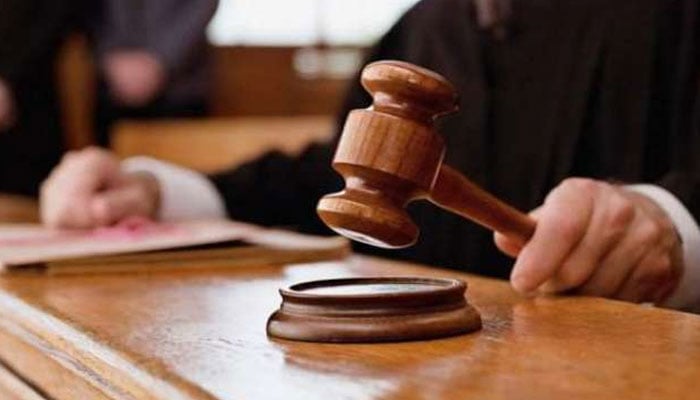Courts asked not to schedule civil cases for three weeks
ISLAMABAD: In view of the growing spread of the contagion COVID-19, the federal government on Tuesday requested the Supreme Court (SC) as well as the provincial high courts not to schedule cases of civil nature for three weeks.
In a letter addressed to the Chief justice of Pakistan Justice Gulzar Ahmed and chief justices of all the high courts, Joint Secretary, Ministry of Law and Justice forwarded a summary of the minutes of the March 13 National Security Committee meeting wherein it was decided that the Chief justice of Pakistan and chief justices of the provincial high courts will be requested to instruct all courts not to schedule cases of civil nature for three weeks
It was further recommended that judicial magistrates and sessions judges be instructed to visit jails concerned for three weeks to process remand and bail cases. It was informed that the request will be reviewed at the end of this period.
In addition, the recommendation of the Islamabad High Court to only fix urgent bail matters also seems appropriate. It is pertinent to mention here that the Supreme Court the other day directed implementation of preventive measures on urgent basis to minimise the spread of the contagion COVID-19, within its premises and to minimise the threat to the litigants, judges, staff as well the lawyers.
Similarly, in order to take stock of the preventive measures at high courts, district courts level, Chief Justice of Pakistan Justice Gulzar Ahmed has called emergency meeting of National Judicial Policy Making Committee (NJPMC) on Thursday, at Supreme Court Islamabad to discuss the issue at length and devise effective strategy for the courts.
Meanwhile, as a part of additional precautionary measures, litigants represented by their counsels have been advised to avoid entering Supreme Court premises to escape overcrowding. However, respondents and in-person petitioners/parties may attend the court as and when summoned.
In Supreme Court Building, wash basins along with liquid soap dispensers have been installed at all entry gates so that people can enter the building after washing their hands.
Similarly, fumigation has been done to disinfect the building, and biometric attendance of the staff has been suspended.
Likewise, medical staff has been deputed at all entry points to monitor the temperature of every person regularly through infrared thermometers while entering the Supreme Court building.
Furthermore, employees have been advised to wash their hands properly prior to joining their work or after receiving any file or document and avoid shaking hands/physical contact with office colleagues and use face masks. Sanitizer dispensers have been installed at the building.
-
 ‘Disgraced’ Andrew Still Has Power To Shake King Charles’ Reign: Expert
‘Disgraced’ Andrew Still Has Power To Shake King Charles’ Reign: Expert -
 Why Prince William Ground Breaking Saudi Tour Is Important
Why Prince William Ground Breaking Saudi Tour Is Important -
 AOC Blasts Jake Paul Over Bad Bunny Slight: 'He Makes You Look Small'
AOC Blasts Jake Paul Over Bad Bunny Slight: 'He Makes You Look Small' -
 At Least 53 Dead After Migrant Boat Capsizes Off Libya
At Least 53 Dead After Migrant Boat Capsizes Off Libya -
 'God Of War' Announces Casting Major Key Role In Prime Video Show
'God Of War' Announces Casting Major Key Role In Prime Video Show -
 Real Reason Prince William, Kate Broke Silence On Andrew Scandal Revealed
Real Reason Prince William, Kate Broke Silence On Andrew Scandal Revealed -
 Drew Barrymore Responds To 'Charlie's Angels' Costar's Comments About Her
Drew Barrymore Responds To 'Charlie's Angels' Costar's Comments About Her -
 Shakira Slips Hard On Stage During Life Show
Shakira Slips Hard On Stage During Life Show -
 King Charles Speaks Out Over Andrew's Scandal: 'Stand Ready To Help Police'
King Charles Speaks Out Over Andrew's Scandal: 'Stand Ready To Help Police' -
 Dax Shepard Recalls Horrifying Accident That Almost Killed Him
Dax Shepard Recalls Horrifying Accident That Almost Killed Him -
 Logan Paul's Bodyguard Hits Fan On Super Bowl Day
Logan Paul's Bodyguard Hits Fan On Super Bowl Day -
 Epstein Files: Anne Hathaway Mentioned As Highly Desired Guest For Bill Gates?
Epstein Files: Anne Hathaway Mentioned As Highly Desired Guest For Bill Gates? -
 Prince Harry Under A Lot Of Stress As Meghan Markle Makes Bizarre Demands
Prince Harry Under A Lot Of Stress As Meghan Markle Makes Bizarre Demands -
 Princess Beatrice, Eugenie's Subtle Break From Disgraced Parents Exposed
Princess Beatrice, Eugenie's Subtle Break From Disgraced Parents Exposed -
 Baby Left In Running Bathtub Dies After Father ‘forgets’ Him
Baby Left In Running Bathtub Dies After Father ‘forgets’ Him -
 King Charles Takes A Major Step To Keep Horrified Prince William Out Of The Loop On Andrew: Insider
King Charles Takes A Major Step To Keep Horrified Prince William Out Of The Loop On Andrew: Insider




